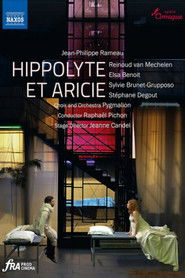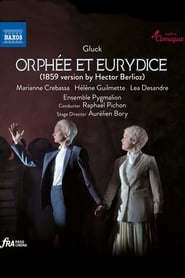detail profile lea desandre

Info Pribadi
Peran Yang Di Mainkan Lea Desandre
 After the fall of Troy King...
After the fall of Troy King...Idomeneo 2024
After the fall of Troy, King Idomeneo can finally think about returning to his homeland of Crete. During his long absence, his son Idamantes took care of the affairs of government and the Troyan prisoners of war, including Ilia, the daughter of King Priam. In order to get out alive from the storm that prevents him from landing in Crete, he promises to sacrifice the first living creature he encounters on his home soil to the sea god Poseidon. Unfortunately, this is his son who rushes to greet him. By sacrificing her life for Idamante's, whom she loves and who reciprocates her love, Ilia manages to appease Poseidon and release Idomeneo from his fateful oath. Production of the Grand Theatre de Geneve, 2024.
 This Salzburg Festival production of Le...
This Salzburg Festival production of Le...Le Nozze di Figaro 2023
This Salzburg Festival production of Le nozze di Figaro (2020) offers a radical reinterpretation of Mozart's opera, directed by Martin Kušej, who continues his exploration of Mozart’s works following Don Giovanni (2002) and La clemenza di Tito (2003). The turbulent comedy, laden with erotic entanglements, exposes themes of patriarchal dependency, sexual exploitation, betrayal, and emotional emptiness. French conductor Raphaël Pichon, renowned for historically informed performances, conducts his first opera at Salzburg after his debut at the festival in 2018.
 The Marriage of Figaro is one...
The Marriage of Figaro is one...Les Noces de Figaro, Opéra Garnier de Paris 2022
The Marriage of Figaro is one of the most emblematic operas in the repertoire. Brahms spoke of it as a “miracle” and the Countess' complaint still resonates today as one of the most heartbreaking musical pages. It was by resuming Beaumarchais' comedy, which caused a scandal in Parisian society, that Mozart and his librettist Da Ponte began their first collaboration. The play was banned by Joseph II in 1785 at the Vienna Theater. Is it because it exposed too much to the forefront the contradictions of an already faltering regime, ready to collapse with the French Revolution? Netia Jones preserves the very essence of Beaumarchais' play by questioning human relationships with humor but not without mischief, in a production which confuses reality and fiction to the point of asking, like the Count: "Are we playing a comedy?" »
 In October 1733 the audience at the...
In October 1733 the audience at the...Hippolyte et Aricie 2020
In October 1733, the audience at the Académie Royale de Musique witnessed the birth of a revolutionary work: Hippolyte et Aricie. With its inventiveness and musical richness, Rameau’s opera marks a break in the history of French music. A similarly revolutionary duo – Jeanne Candel and Raphaël Pichon – get to grips with this work for the Opéra Comique.
 Offenbachs mockery of bourgeois ideals the...
Offenbachs mockery of bourgeois ideals the...Orphée aux Enfers - Salzburger Festspiele 2019 2020
Offenbach’s mockery of bourgeois ideals, the sublimity of music and the institution of marriage ensures that the moralistic sermonizing of ‘Public Opinion’ falls on deaf ears. The mysterious figure of John Styx tells the story of behind-the-times Orpheus and his hacked-off Eurydice, of gods and goddesses seeking diversion, jaded with humdrum life in Olympus. He tells of the rebellion in the pantheon, which Jupiter adeptly averts by promising an amusement for his entourage. Burning with curiosity to see the beauteous captive and the contest between Jupiter and Pluto for Eurydice’s favour, the illustrious company embarks on an infernal ride to the underworld that culminates in what is surely the most wellknown can-can in the history of music. And what of Eurydice? She ends up putting a spoke in everyone’s wheel…
 As Christof Loy put it Cos...
As Christof Loy put it Cos...Così fan tutte - Salzburger Festspiele 2020 2020
As Christof Loy put it: Così fan tutte invites us to embrace the complexity of life and face the future with heads held high. In his staging of the version he abridged with Joana Mallwitz for the Salzburg Festival 2020 the focus is wholly on the figures and the subtle choreography of their emotional states — in a space that like a magnifying glass exposes the intricate mechanisms between the characters. In this way the production leads the protagonists and the audience to experience the ‘serene calm’ that can perhaps indeed cure our own ‘distempers’.
 Amour the messenger of the gods...
Amour the messenger of the gods...Gluck: Orfeo ed Euridice 2018
Amour, the messenger of the gods, tells Orpheus that he may descend to the underworld and return with Eurydice. His singing has the power to appease the Furies and animate the blessed Shadows. Yet, his voice cannot reassure Eurydice who despairs of the feigned indifference of Orpheus, put to the test by Jupiter. Raphaël Pichon conducts the opera of operas and Aurélien Bory displays the giddiness of the mental and supernatural spaces traveled by Orpheus and beyond. Marianne Crebassa plays a new breeches role with Hélène Guilmette (Hélène in Le Timbre d’argent) and Lea Desandre (the title role in Alcione).



 coproduction with the Teatro Real Madrid
coproduction with the Teatro Real Madrid